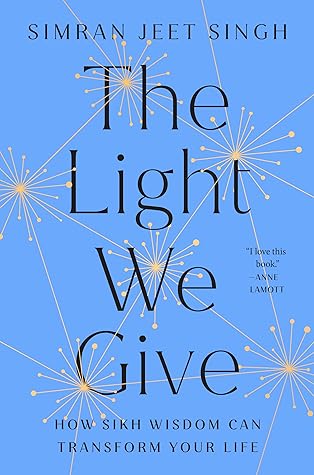More on this book
Community
Kindle Notes & Highlights
Started reading
January 2, 2024
we can conquer our minds, we can conquer the world.”
The lantern in Khalra’s parable did not seek to end darkness entirely. It was humble enough to recognize that this was not a reasonable objective, and instead it focused on its own small corner. By doing its part, the lantern’s flicker of light inspired those around it to do the same.
Happiness is a function of our individual expectations. The lantern did not set out to save the world. Its satisfaction came in understanding the needs of those it could reach and in seeking to meet those needs. This is what it means to serve selflessly.
Seva demands humility, disabusing us of our desire to bear the weight of the entire world on our shoulders. Yes, there is endless suffering and injustice in our world, and yes, there are infinite issues to address. But aiming to fix all the problems around us or expecting ourselves and others to always do the right thing is not realistic. If that’s the goal we set for ourselves, then we are setting ourselves up for perpetual disappointment and frustration.
When I watch people help one another, a number of questions come to mind. I wonder what they get out of giving to others. I wonder what moves them to give up something of their own for someone else’s benefit. I wonder who they are and who they care for at home.
Our individual liberation is bound up with one another’s; we seek our own freedom while seeking freedom for all.
That some people see me and think I belong in India is confounding and laughable. I’m not better off there, nor is it a safe place for my community. For as long as I can remember, I have declined to identify as Indian, choosing instead to identify with that part of my heritage as Sikh, Punjabi, or South Asian.
I realized that I had to embrace the discomfort. I also realized the importance of proactively challenging racism wherever and whenever I encountered it.
“In a racist society, it’s not enough to be non-racist. We must be anti-racist.”
Sikhi places little emphasis on the afterlife because it’s a question of speculation: If no one knows with certainty what happens after we die, then why dwell on it so much? Sikhi teaches us to do what we can in the world that we know, that by dwelling in the here and now we can achieve joy and love and enlightenment.
“Until lions have their
own historians, tales of the hunt will always glorify the hunter.”
“No fear, No hate (Nirbhau, Nirvair).”
“Set fire to any practices that take you away from love.”
We can believe anything. We can preach anything. But what truly shapes our character is what we practice.
Even if I tried to blend in by shaving and removing my turban, I’d still be perceived as a brown-skinned foreigner. Racism always discriminates but rarely discerns.
Embracing difficult moments as opportunities for personal growth can be both empowering and liberating.
Our liberation comes in realizing that, no matter what’s happening in our lives, we can always choose joy and freedom.
1700s that Sikhs remember as the Lesser Holocaust (Chota Ghallughara), which took place in 1740, and the Greater Holocaust (Vadda Ghallughara), which occurred in 1762. Just before the Chota Ghallughara, the governor of Lahore, Zakaria Khan, announced that he would pay citizens who helped wipe out the entire community.
the turbans on our heads and the hair on our faces have meant that Sikhs would stand out wherever we are; that we would be easy targets of those ruled by fear and hatred of the unfamiliar; that by opting to be hypervisible, we were also choosing to put ourselves at risk.
If I have learned anything from being in a brown-skinned body in the United States of America, it’s that we’re not supposed to share our discontent with the people around us.
that finding inner peace and working for justice go hand in hand, and that to get there, we have to uncover what connects us—but
chardi kala, a phrase that translates roughly to “everlasting optimism.”
This fits into a larger pattern of Americans asking the marginalized to change themselves rather than demanding change from those who enact the violence.
learned about the immense power of gratitude from these survivors—that it can be an attitude, but only if we choose to adopt it as such and practice it every day. In this way, being thankful is a source of inner light in even the darkest moments we encounter.
Counting my blessings became a self-fulfilling loop—the more I looked for them, the more apparent they became.
While dehumanizing someone we dislike is an easy perspective to hold, it’s a heavy and useless burden to carry.
Ik refers to the oneness of the world, the connectedness of reality, the intermingling of creator and creation, the integration of all we know, the wholeness of our being. The second component, oankar, refers to a dynamic, divine force that permeates every aspect of our world.
If everything we know in our physical world is composed of atoms, then think of each atom as being infused with the same divinity.
ethic of activism rooted in those same values, one that seeks to serve all rather than just the self.
Bhai Ghanaiya said: You taught us that we all share the same light. I don’t see enemies among those who are injured. I just see people who need our help. So that’s what I’m doing.
We unlock the power of our ideals when we put them into action.
Everyone is equally divine, an extension of your own divine self.


